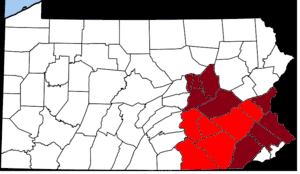Pennsylvania Dutch English
Pennsylvania Dutch English is a dialect of English that has been influenced by the Pennsylvania German language. It is largely spoken in South Central Pennsylvania, both by people who are monolingual (in English) and bilingual (in Pennsylvania German and English). The dialect has been dying out, as non-Amish younger Pennsylvania Germans tend to speak General American English. Very few non-Amish members of these people can speak the Pennsylvania German language, although most know some words and phrases. The World War II Generation was the last generation in which Pennsylvania Dutch was widely spoken outside the Old Order Amish and Old Order Mennonite communities.[1]
| Pennsylvania Dutch English | |
|---|---|
| Native to | United States, Canada |
| Region | Pennsylvania; Ohio; Indiana; Ontario; and elsewhere |
Indo-European
| |
| Latin (English alphabet) | |
| Language codes | |
| ISO 639-3 | – |
 Counties in "Pennsylvania Dutch Country", one of several regions in which Pennsylvania German and "Pennsylvania Dutch English" have traditionally been spoken. | |
Features of Pennsylvania German influence
Pennsylvania Dutch English differs from standard American English in various ways. [2] Some of its hallmark features include the following:
- Widespread devoicing of obstruents.
- The use of certain vowel variants in specific phonological contexts.
- The use of Pennsylvania German verb and noun stems in word construction.
- Specific intonation patterns for questions.
- Special placement of prepositional phrases in sentences (so that "Throw some hay over the fence for the horse" might be rendered "Throw the horse over the fence some hay").
- The use of "ain't" and "not" or "say" as question tags.
- The use of "still" as a habitual verbal marker.
- The use of the phrase "what for" to mean "what kind of." (German = "was für")
- Use of the word "yet" to mean "still," such as "do you work at the store yet?" to mean "do you still work at the store?"
- Use of terms such as "doncha know" and "so I do" or "so he does" at the end of declaratory sentences.
- Use of the word "awhile" at the end of sentences proposing simultaneous actions (e.g. "Go get the tea out of the pantry; I'll start boiling the water awhile.").
- Omitting "to be" from the passive construction in an infinitive following "needs" or "wants"( e.g. "the car needs cleaned" instead of "the car needs to be cleaned").
Other calques include:
| Pennsylvania Dutch English term | Standard English term | Pennsylvania German term | Related Standard German term | Word-for-word Standard German translation |
|---|---|---|---|---|
| Outen the lights. | Turn off the lights. | Mach's Licht aus. | Mach das Licht aus. | "Make the light off." |
| The [noun] is all. (e.g. The food is all.) | There is no more [noun]. | Die [nouns] sin all. | Die [nouns] sind alle. | "The [nouns] are all." |
| Don't eat yourself full. | Don't fill yourself up. | Iss dich net voll. | Iss dich nicht voll. | "Eat yourself not full." |
| There's cake back yet. | There is cake to come. | Es gibt datt noch Kuche. | Es gibt da noch Kuchen. | "It passes there yet cake." / "There is yet cake." |
| It wonders me. | It makes me wonder. | Es wunnert mich. | Das wundert mich. | "It wonders me." |
| Spritzing | Lightly raining | Schpritze | Spritzen | "Spurting / Squirting" |
| Rutsching | Squirming | Rutsche | Rutschen | "Slipping / Sliding" |
| Schusslich | Clumsy (with things, usually due to hurrying) | Schusslich | Schusselig | "Scatty / Scatterbrained" |
| Doplich / Doppich | Clumsy (with oneself) | Doppich | Täppisch / Tappig | "Clumsy" |
| Yah, well. | Whatever / It makes no difference | Ya, well. | Ja, wohl. | "Yes, well." |
| Wutz | Pig (when someone eats a lot) | Die Wutz | Die Wutz | "The Pig" (regional word) |
| Kutz / Kutzing | Vomit / Vomiting | Die Kutz / Kutze | Die Kotze / Kotzen | "Vomit" |
| Schtriwwelich | Uncombed or stringy | Schtriwwelich | Strubbelig | "Disheveled" |
| Brutzing / Grexing | Whining/ Complaining | Brutze / Grexe | Jammern / Klagen | "Whining / Complaining" |
| Wuntz (Once) | For a second / Quickly | Eemols | Einmal | Once / One-time |
| Mox nix | Irrelevant | Macht's nix | (Das) Macht nichts. | "(That) Matters not." |
| Nix nootz / Nix nootzie | Misbehaving (usually referring to a little kid) | Nixnutz | Nichtsnutz | "No-use." |
| Schnickelfritz | Troublemaker (usually referring to a little kid) | Schnickelfritz | Schnacken + Fritz | "Chatting Fritz" |
| That's all | None left / All gone | All / Alle | Alle / Leer | "All / Blank" |
| Right like | Exactly the same as | Genau wie / Yuscht wie | Genau wie | "Just like" |
Other idioms include "Make wet?" meaning "Is it going to rain?", "hurrieder" meaning "faster", and "dippy eggs/ecks" meaning "over-easy or soft-boiled eggs".
See also
- Lunenburg English, a dialect of Canadian English similarly influenced by German
- Northeast Pennsylvania English
- Philadelphia dialect
- North American English regional phonology
- Regional vocabularies of American English
References
- Di Domizio, Tony (2010-11-10). "Pennsylvania Dutch dialect is still alive in the region". Souderton Independent.
- Lynch, Larry. "Pennsylvania Dutch: Structure, Pronunciation, and Popular Expressions". Bright Hub Education.
External links
- "Pennsylvania German versus Germany German". Get Germanized. youtube.com.
- www
.padutchdictionary .com - www
.deitshbooks .com